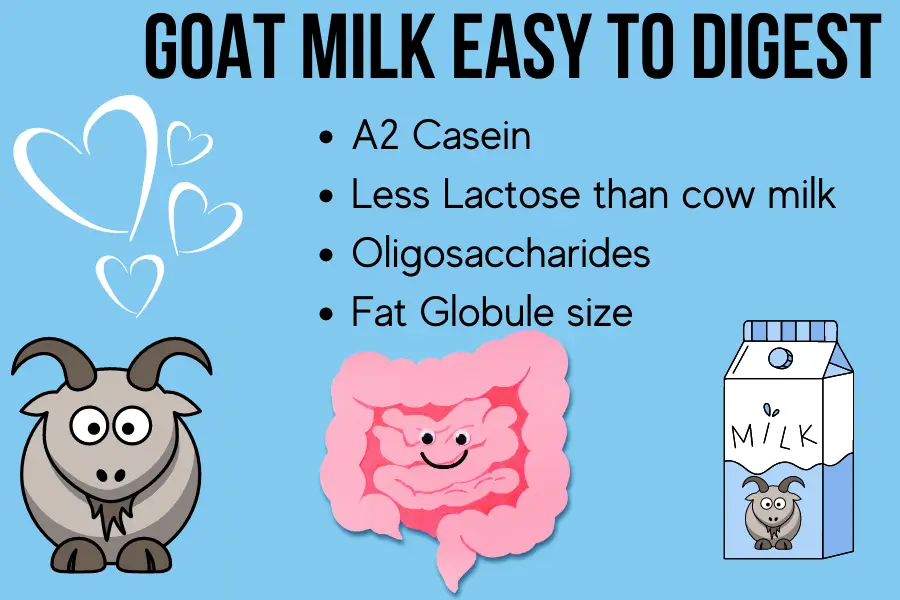
Goat milk has gained popularity among health enthusiasts due to its numerous benefits and easier digestibility compared to cow milk. Many individuals who find themselves intolerant or sensitive to cow’s milk often discover that goat milk is a suitable alternative, providing essential nutrients without causing digestive issues. The unique composition of goat milk makes it a valuable option for those looking for a more gut-friendly dairy option.
Table of contents
Prebiotics make Goat’s Milk Easier Digest
The ease of digestion associated with goat milk can be attributed to its lower lactose content and the presence of a prebiotic called oligosaccharides. These prebiotics help promote the growth of beneficial gut bacteria, which in turn, aid in lactose digestion. Additionally, goat milk is less inflammatory and lower in potential allergens, which furthers its compatibility with sensitive digestive systems. It also has a2 casein.
Key Takeaways
- Goat milk is easier to digest due to lower lactose content , the presence of prebiotics, and a2 casein
- It offers essential nutrients while being less inflammatory and lower in potential allergens.
- Suitable for those with lactose intolerance or sensitivity, it’s a gut-friendly alternative to cow milk.
Why Goat’s Milk is Easier to Digest
Lactose Content and Intolerance
Goat’s milk is generally considered to be easier to digest than cow’s milk due to its lactose content, fat globule size, and protein structure. As goat’s milk contains slightly less lactose than cow’s milk, it may be more suitable for people with lactose intolerance. The symptoms of lactose intolerance, such as gas, bloating, diarrhea, and inflammation, can be milder in individuals consuming goat’s milk compared to cow’s milk. It is crucial to note that while goat’s milk may be easier to digest for some people, goat milk is not dairy free, and it is not suitable for individuals with a severe lactose intolerance or milk allergies.

Goat’s milk also has smaller, more uniform fat globules, which can make it easier to digest and absorb. The naturally homogenized structure of goat’s milk means that it does not require additional processing to have an even distribution of fats. Moreover, goat milk is rich in medium-chain fatty acids, which are easier for the body to break down and utilize, contributing to easier digestion.
The protein structure in goat’s milk is slightly different from that in cow’s milk, which may also affect its digestibility. Goat milk contains less alpha-s1 casein, a protein known to cause allergic reactions in some people. Instead, it contains a2 casein. This lower a1 casein content may make goat milk a better option for those with cow’s milk protein allergies or sensitivities.
Furthermore, goat’s milk is abundant in essential nutrients such as calcium, potassium, phosphorus, magnesium, and vitamin A – making it a nutritious alternative to cow’s milk. The absorbability of these nutrients is also reported to be higher in goat’s milk, providing more significant health benefits.
In summary, goat’s milk is easier to digest than cow’s milk primarily due to its lower lactose content, smaller fat globules, and different protein structure. While it may not be suitable for those with severe lactose intolerance or milk allergies, goat’s milk offers numerous nutritional benefits and improved digestibility for people with mild lactose intolerance or sensitivities to cow’s milk proteins.
Nutritional Profile of Goat’s Milk
Goat’s milk is a nutritious alternative to cow’s milk, containing essential nutrients such as proteins, fats, carbohydrates, vitamins, and minerals. Its unique composition makes it easier to digest for some individuals compared to cow’s milk.
In terms of protein, goat’s milk contains slightly less than cow’s milk but has a similar composition. The proteins found in goat’s milk are smaller and have a different structure, which can make it easier for individuals with milk allergies or lactose intolerance to digest. The primary proteins present in goat’s milk are casein and whey, with the former being easier to digest.
Goat’s milk is naturally low in fat, with a fat content that is comparable to cow’s milk. However, the fat globules in goat’s milk are smaller, and this can contribute to the milk’s easier digestibility. When it comes to healthy fats, goat’s milk contains medium-chain fatty acids, which are known for their potential health benefits and quick absorption.
As for dairy nutrition, goat’s milk contains vital nutrients such as calcium, potassium, magnesium, phosphorus, and iron. Goat’s milk is also rich in vitamins, including vitamin A, riboflavin (vitamin B2), niacin (vitamin B3), vitamin B6, vitamin C, and selenium. These nutrients contribute to overall health and wellbeing, supporting growth, immune function, and bone health.
Raw goat milk does not have Vitamin D, but it is usually fortified when sold commercially. You can buy goat milk at Amazon, and at most major grocery store, and also a farmers markets, and directly from farmers.
Goat milk also does not have much iron it in, and if you drink it exclusively (or if your child does) that can lead to anemia from drinking goat milk.
The sugar content in goat’s milk, lactose, is slightly lower than in cow’s milk. This is beneficial for those with mild lactose intolerance or sensitivity, as it may cause fewer digestive symptoms such as gas, bloating, or diarrhea. However, it’s important to note that goat’s milk is not entirely lactose-free.
Goat’s milk can be consumed in various forms, such as yogurt, cheese, and kefir. The fermentation process in yogurt and kefir reduces lactose levels even further, making these choices an excellent option for those with lactose intolerance. Additionally, the probiotics present in fermented dairy products can improve overall gut health by increasing the population of good bacteria.
In comparison to plant-based milks like almond, soy, or oat milk, goat’s milk provides a more comprehensive nutritional profile. It offers essential nutrients such as protein, calcium, and vitamins that may be less available in some plant-based alternatives. Although plant-based milks can be fortified with these nutrients, the body tends to absorb them more readily when they come from an animal source like goat’s milk.
In conclusion, it’s evident that goat’s milk offers a nutritional profile that can benefit a wide range of individuals. Its unique composition makes it easier to digest for some, and its nutrient-dense profile provides essential vitamins and minerals for a balanced diet.
Goat’s Milk and Allergies
Casein Protein and Milk Allergies
Goat’s milk contains different casein proteins compared to cow’s milk, which may be beneficial in situations involving dairy allergies. Goat milk has a lower amount of alpha-s1 casein, a common allergen in cow’s milk, making it a viable alternative for those with cow’s milk allergy or cow’s milk protein intolerance. Despite having a different casein profile, goat’s milk still contains lactose, the sugar found in cow’s milk that may cause lactose intolerance symptoms. However, goat milk contains slightly less lactose than cow’s milk, which may be easier to digest for some people.
The nutritional composition of goat’s milk is generally similar to cow’s milk, providing essential nutrients like calcium, potassium, vitamin A, and riboflavin. However, there are subtle differences that may impact digestibility and overall nutrition. For example, goat’s milk has a higher content of medium-chain fatty acids (MCFAs), which may contribute to quicker absorption and easier digestion. The fat globules in goat’s milk are also smaller, which may result in a smoother texture and better assimilation in the digestive tract.
Enzymes in goat’s milk help break down lactose, thereby reducing symptoms such as gas, bloating, and diarrhea that are commonly experienced by lactose intolerant individuals. Furthermore, goat’s milk has higher levels of oligosaccharides, a type of prebiotic fiber that promotes the growth of beneficial bacteria in the gut and supports a healthy digestive system.
Despite potential benefits that goat’s milk may offer in terms of digestion and allergies, it is important to recognize that not all individuals with milk allergies or lactose intolerance can safely consume goat’s milk. Consultation with a healthcare professional is advised before introducing goat’s milk or any other dairy alternative into the diet, especially for individuals with existing allergies or digestive issues.
It is also worth noting that pasteurized goat’s milk is generally safer and has a longer shelf life than raw goat’s milk. Pasteurization kills potentially harmful bacteria while maintaining the milk’s nutritional value. In addition to goat’s milk, there are various non-dairy alternatives, including almond milk, soy milk, and rice milk, which provide different health benefits and might be suitable for individuals with cow’s milk allergies or lactose intolerance.
Comparing Goat’s Milk to Other Milk Alternatives
Goat’s milk has gained popularity in recent years due to its nutritional profile and easier digestibility compared to cow’s milk. When compared to other milk alternatives, goat’s milk stands out in various aspects, including protein, calcium, and fat content.
In terms of protein, goat’s milk contains 9 grams per serving, slightly more than the 8 grams found in cow’s milk. This is also higher than most plant-based milk alternatives, such as almond milk, which typically contains only 1-2 grams of protein per serving. Oat milk, on the other hand, may provide around 4 grams of protein per serving.
Nutritionally, goat’s milk provides essential nutrients like calcium, potassium, vitamin A, and magnesium. It contains 330 grams of calcium per serving, higher than cow’s milk, which offers around 300 grams per serving. Mineral content, including copper, selenium, and zinc, is also better balanced in goat’s milk compared to cow’s milk.
For those watching their sugar intake, goat’s milk has slightly less lactose than cow’s milk. Individuals who are lactose intolerant may find goat’s milk easier to digest due to its smaller fat globules and different protein structure. Goat’s milk also contains oligosaccharides, which can act as prebiotics and promote the growth of healthy gut bacteria.
When considering allergies, casein proteins in goat’s milk are less likely to cause an allergic reaction than those in cow’s milk. Goat’s milk might be a suitable alternative for individuals with a cow’s milk allergy.
However, for those following a dairy-free or vegan diet, plant-based milk alternatives, like almond milk, soy milk, or oat milk, are more suitable options. These come with their distinct nutrition profiles, but can generally be lower in calories, fat, and cholesterol levels.
In addition to liquid milk alternatives, goat’s milk is also available in various products, such as cheese and yogurt. These products offer similar health benefits due to their easier digestibility and nutrient profile.
One downside to goat’s milk might be its taste, as it’s often described as having a more distinct, tangy flavor than cow’s milk. Some people enjoy the unique taste, while others may prefer cow’s milk or plant-based alternatives for their milder flavor profiles.
Summary
In conclusion, goat’s milk offers a wide range of health benefits and can be a suitable alternative to cow’s milk and other milk substitutes for those seeking better overall nutrition and improved digestibility, as well as for those with allergies or lactose intolerance.
Video
The following short video by Dr Tanya Altman is mostly a promotion video for the Aussie Bubs formula product. However, Dr. Altman also does a good job of explaining why goat milk is easier to digest. Skip to 0:35 to get that answer directly.
Frequently Asked Questions
Goat milk is easier to digest because it contains less lactose than cow’s milk, making it a better option for people with lactose intolerance. Additionally, the protein structure in goat milk has a lower level of alpha-S1 casein and more A2 Casein compared to cow’s milk, which can contribute to its hypoallergenic properties.
Goat milk is good for sensitive stomachs due to its lower lactose levels compared to cow’s milk, making it less likely to cause digestive discomfort for those who are lactose intolerant. Moreover, it contains a higher level of medium-chain fatty acids, which are more easily digestible and absorbed by the body. It also contains A2 casein.
In terms of digestion, goat milk is generally considered easier to digest than cow milk. This is primarily because goat milk has lower levels of lactose and a different protein structure, which makes it more suitable for people with lactose intolerance or cow’s milk allergies.
While goat milk still contains lactose, it has lower levels compared to cow milk. This means that people who are lactose intolerant may find goat milk easier to digest and less likely to cause discomfort.
Goat milk contains more calories and fat than cow milk, but it also has higher levels of medium-chain fatty acids, which can be easily digested and utilized for energy. It’s important to note, however, that including goat milk in a weight-loss plan should be part of a balanced diet and exercise program.
Goat milk can be a suitable option for toddlers, especially if they have a cow’s milk allergy or sensitivity. However, it’s important to consult with a pediatrician before introducing goat milk to a child’s diet, as they may have specific nutritional needs that need to be considered.




